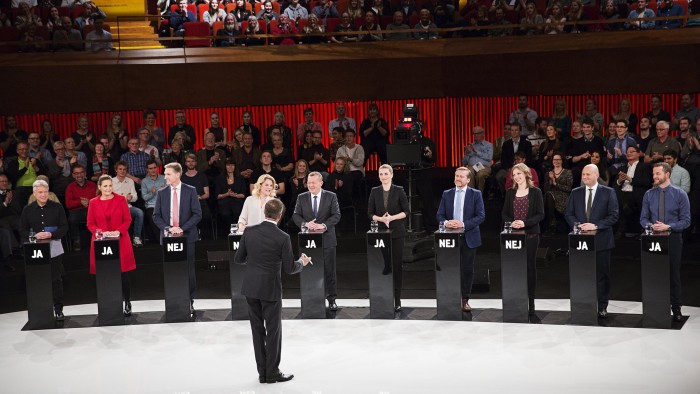Denmark’s referendum becomes clarion call for eurosceptics

Roula Khalaf, Editor of the FT, selects her favourite stories in this weekly newsletter.
Denmark’s seventh referendum on EU integration offers Brussels and Britain another political lesson on the challenges of selling a pro-European message to wary voters.
While its political leaders have a broadly pro-EU in outlook and temperament, over the past quarter century the Danes proved doughty defenders of national sovereignty, voting against joining the euro in 2000 and rejecting the Maastrict treaty in 1992.
Thursday’s referendum is in theory about whether Denmark should swap its opt-out on EU justice and home affairs matters for an opt-in, affecting issues such as cross-border policing.
But the plebiscite has become a clarion call for eurosceptics keen on fighting against the power of Brussels. The vote, which polls put on a knife edge, will be closely watched across the EU and especially in the UK, which is preparing for its own EU referendum.
“If the Danes vote No it can’t be good news for David Cameron [the British prime minister]. It will only complicate his life,” said Poul Skytte Christoffersen, a veteran Danish diplomat and EU official who negotiated the 1993 opt-outs.
Denmark’s debate had once again shown, he said, that the technical advantages of co-operation “are not easy to sell” when the debate becomes about sovereignty and control.
No plebiscite about the EU ever sticks to the question under consideration. But Denmark’s latest referendum is an extreme example. External events such as the summer surge in refugee numbers and last month’s terrorist attacks in Paris have turned what was once a rather technical discussion of EU crime and justice policy into a far more emotive debate.
“It is infused with emotion,” said Frederik Hjorth, a researcher at the University of Copenhagen. “But the dominant emotion is mistrust and anger at politicians.”
The stakes in Britain’s referendum are far higher than in Denmark’s. But British eurosceptics are banking on voters showing the same resilience to warnings about life outside the EU as the Danes.
“It is clear that millions of Danes aren’t fooled by that sort of scaremongering,” said Matthew Elliott, chief executive of the Britain’s Vote Leave campaign, while noting the pro-EU effort to link the union with safety.
“When they get a chance to vote on it the people of Europe often reject the EU and the establishment’s dreams of a federal Europe.”
The Danish referendum was announced with exquisitely bad timing. Lars Lokke Rasmussen, prime minister only since June, announced on August 21 that the vote would be held in December and touted the opt-in as essential for helping tackle cross-border crime.
Within days, images of refugees pouring into Denmark — although most were on their way from Germany to Sweden — dominated TV bulletins. Any attempt to make it a low-key vote was lost.
Kristian Thulesen Dahl, head of the eurosceptic Danish People’s party that backs Mr Rasmussen in parliament, called the referendum “one of the most important decisions for Denmark for many, many years”.
He added: “It is important because it is about our self-determination and democracy. It is important because it is about our right to be masters in our own house.”
Most crucially, the Danish People’s party has focused on the issue of immigration. Danes, through their opt-out, have not been part of discussions about whether to participate in the proposed scheme to relocate asylum seekers throughout the EU.
But Mr Thulesen Dahl has skilfully exploited public uncertainty over what the opt-in would mean and whether it would bind Denmark on immigration issues. Mr Rasmussen insists not, saying that a further referendum would be necessary and that this pledge lasts “until the sun burns out”.
The Paris attacks have also affected the vote, causing much of the campaign to stall and leaving just over a week for the main debate. “They have not shaped the debate so much as stunted it,” said Mr Hjorth. He argued that Mr Rasmussen missed a trick by not suggesting that the Paris attacks showed the need for cross-border policing.
Instead, Mr Thulesen Dahl has sought to exploit public discomfort about Denmark’s open borders. The clash with the government is particularly piquant as the Danish People’s party is Mr Rasmussen’s main ally in parliament even though it gained more seats than the prime minister’s Liberals in June’s elections.
Mr Hjorth characterised the election as a “second-order” — like voting for the European Parliament — which means the public may be inclined to use it to punish Mr Rasmussen.
“There is a sense of distrust against the government already. People are going to use this vote as a protest. In a way, it’s not about European issues, it’s about the government,” he added.
Comments